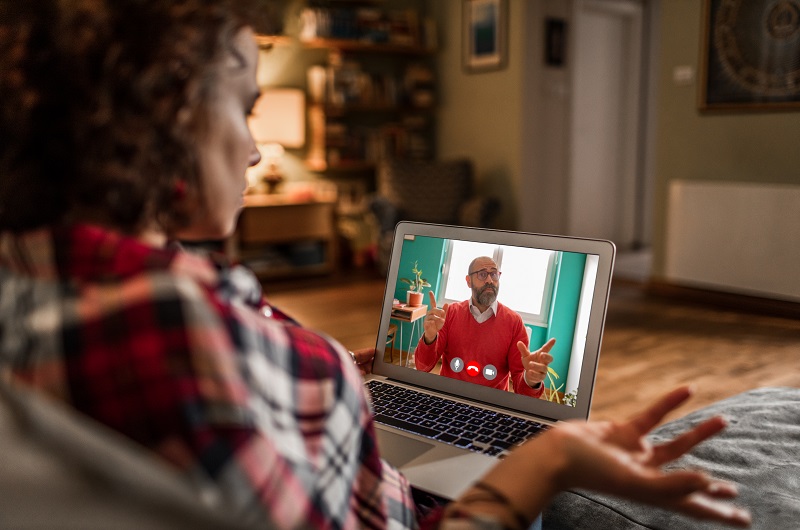Insight Paper September 1, 2021
Benefits of Virtual Mental Health Services
Could this be an option for you?
In the spring of 2020, the COVID-19 pandemic swept the globe and in the following 18+ months, the only constant in everyone’s lives was change. The pandemic changed the way we worked, it changed the way we connected with our friends and colleagues, and it changed our perception of how to interact with the world around us. These swift and sweeping changes proved difficult for many people across the United States to cope with, leading to a stark increase in mental health issues across the country. Mental health experts have asserted that there has been a significant increase in feelings of depression and anxiety likely caused by social isolation, uncertainty about the immediate future, and economic stress caused by the pandemic. One CDC survey found that as the pandemic dragged on, Behavioral Health symptoms have occurred at nearly double the rate that was expected pre-COVID (National Institute of Mental Health). To make matters worse, social restrictions put in place to fight the spread of the virus severely limited patients’ access to traditional mental health services. As people sought new avenues to receive treatment, a massive shift occurred in the market: the same digital revolution that enabled people to continue working and socializing now allowed them to seek treatment for their mental health symptoms.
A virtual healthcare visit is a patient visit in which the clinician connects with the patient using communications technology. The communications technology used varies across several platforms, from phone calls and text messages to video conference services such as Zoom, Microsoft Teams, and WebEx. While many of these platforms are not new, they were previously not available as patient-clinician interfaces due to restrictions put in place by the US Government, but many of these restrictions were loosened or removed in an effort to improve patient care during the COVID-19 pandemic. Additionally, Centers for Medicare & Medicaid Services (CMS) and many insurance companies expanded coverage for virtual care visits under various circumstances. This shift to a virtual healthcare platform has demonstrated many benefits for patients, several of which are outlined below.
Five Benefits Of Virtual Mental Health Services:
- Increased Access to Services
Virtual meetings allow you to have your appointment anywhere. This is extremely helpful for those who live in remote areas, lack reliable transportation, endure physical limitations, or work during appointment hours. For those without any of the above factors, this still allows time saved from commuting and flexibility in scheduling. - Increased Service Usage
A natural consequence of increased accessibility is a rise in patients sticking with treatment plans. Eliminating the need to travel means that patients are less likely to cancel appointments due to sickness, inclement weather, or difficulty traveling. Studies show that patients who regularly utilize the treatment they need have overall better outcomes and achieve these outcomes sooner. - Patient Comfort During Appointments
By removing the need to head to a doctor’s office for appointments, patients can now seek treatment from the comfort of their own home. In fact, patients are often encouraged to take appointments from wherever they are most comfortable, including their couch or bedroom. When being treated in a more comfortable and familiar setting, patients are able to relax which makes it easier for a provider to connect with the patient and to get a more candid view into the patient’s daily life and environment, ultimately informing the provider’s treatment and potentially improving the effectiveness of treatment. - Savings on Expenses and Time
Patients no longer incur travel related expenses such as gas, public transport, etc. Additionally, by eliminating travel times, it becomes easier for a patient to fit an appointment into their daily lives. The elimination of these costs makes treatment more appealing to patients and can lead to an individual choosing to engage in mental health services when they previously may not have. - Outcome Progress Improvements
The combination of the benefits listed above ultimately leads to an increase in treatment effectiveness and recovery speed. Patients are more likely to seek treatment, find treatment, stick with treatment, and be more relaxed and engaged in treatment. All of these benefits improve the ability of providers to treat patients and improve the quality of life of the patient. (Georgetown Psychology)
While we have outlined the many benefits of virtual mental health services, this shift in treatment does not come without drawbacks. Some of these drawbacks include providers not being able to see certain body language that can help with diagnosis, if provider and patient are not fully engaged virtually it can limit effectiveness, and technical challenges and difficulties can arise causing issues connecting and completing appointments. Virtual healthcare is a change and one that not all patients may trust for their mental health services. Nevertheless, virtual healthcare will be here to stay beyond COVID-19, so if you are interested in expanding your Virtual Mental Health Services, please contact a Trexin Advisor here.
References
https://georgetownpsychology.com/2020/09/the-benefits-of-online-therapy-during-a-pandemic/
https://health.clevelandclinic.org/how-telemedicine-is-enhancing-healthcare-during-the-coronavirus/
https://hbr.org/2020/12/digital-tools-are-revolutionizing-mental-health-care-in-the-u-s
https://micoedward.com/wp-content/uploads/2020/07/Covid-19-Tech-05.1.jpg
https://eab.com/insights/daily-briefing/student-affairs/the-pros-and-cons-of-virtual-mental-health-services-according-to-experts/
https://www.nimh.nih.gov/

